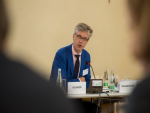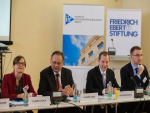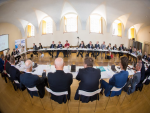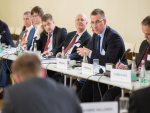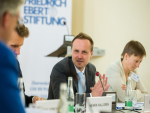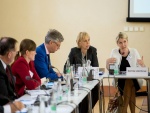Future Trajectories of Europe’s Eastern Policy: Chances and Challenges
FES Prague and the Institute of International Relations Prague organized closed expert conference focusing on the recent publication commisioned by Friedrich-Ebert-Stiftung "The EU and the East in 2030. Four Scenarios for Relations between the EU, the Russian Federation, and the Common Neighbourhood" and the predictions the report makes.
23. 6. 2015 (13:30)
Tento obsah není aktuální Toskánský palác / Tuscany Palace, Hradčanské náměstí 182/5, Prague 1
The war in Ukraine and the annexation of Crimea resulted in deep crisis in relations between the Russian Federation and the countries of the transatlantic community. The Visegrad countries and Germany as members of this community face a number of dilemmas regarding the future EU’s policy towards its eastern neighbours, peace in and consolidation of Ukraine and new nature of relations with Russia. The Friedrich-Ebert-Stiftung commissioned the report “Europe and the East in 2030” based on three workshops in which a group of experts identified the driving forces that shape the relationship and discussed four possible future trajectories for the EU's relationship with its eastern neighbours. The expert workshop hosted by the Friedrich-Ebert-Stiftung and the Institute of International Relations will present the four scenarios and discuss what policy options Visegrad states, Germany and their European partners should consider to define their common interests and shape the EU's future policy in order to make the positive scenarios more likely.
Programme
14:00 – 14:15 Opening remarks
- Reinhard Krumm, Director of the Department for Central and Eastern Europe, Friedrich-Ebert-Stiftung Berlin
- Petr Kratochvíl, Director of the Institute of International Relations Prague
14:15 – 15:00 Presentation of Scenarios
Chair: David Král, Head of the Policy Planning Department, Ministry of Foreign Affairs, Prague
- Beate Martin, Friedrich-Ebert-Stiftung Berlin
- Maryna Vorotnyuk, Researcher at the National Institute of Strategic Studies, Odessa: “Shared Home”
- Henrik Hallgren, Chairman of the Eurasia Forum, Stockholm: “Broken Home”; „Common Home”
- Olga Shishkina, Lecturer in the International Relations and Foreign Policy of Russia Department at Moscow State Institute of International Relations: “Divided Home”
[youtube]http://www.youtube.com/watch?v=KQS5PIFq7NE[/youtube]
15:30 – 17:30 “Towards a progressive Eastern Policy for the EU”: Response to Scenarios by experts from Visegrad countries
Chair: Vladimír Handl, Researcher, the Institute of International Relations Prague
- Reinhard Krumm, Director of the Department for Central and Eastern Europe, Friedrich-Ebert-Stiftung Berlin
- Petr Kratochvíl, Director of the Institute of International Relations Prague
- András Rácz, Senior Research Fellow at the Finnish Institute of International Affairs, Helsinki; Member of the Board of the Centre for Euro-Atlantic Integration and Democracy, Budapest
- Elżbieta Kaca, Analyst at the Polish Institute of International Affairs, Warsaw
[youtube]http://www.youtube.com/watch?v=waS1tdsVpX4[/youtube]
You can download the scenarios here.
Photos
Spolupráce / Záštita
Friedrich-Ebert-Stiftung Prague
